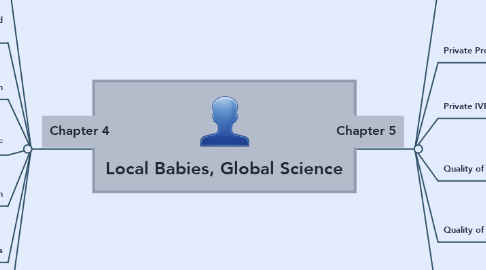
1. Chapter 4
1.1. The "Americans"
1.1.1. Immigration to America by infertile Egyptians seeking fertility treatments often means increased "family interference upon their return home.
1.2. Reproductive Medicine and Religious Morality
1.2.1. Religious morality in Egyptian test-tube baby making represents one of the most fundamental arenas of constraint on the practice and use of new reproductive technologies in Egypt.
1.3. Fatwas and "Official" Islam
1.3.1. Fatwas, the nonbinding religious opinions, is held by three mandated sources. That is the Grand Mufti of Egypt, those issued by the Grand Shaikh of Al-Azhar University, and those issued by the Fatwa Committee of Al-Azhar University.
1.4. "Unofficial" Discources of Islam and IVF
1.4.1. IVF is only permissable as long as sperm and egg come from husband and wife, according to Al-Azhar fatwa.
1.5. Discourses of Donation
1.5.1. Third party donation is haram, which makes the practice considered "against the religion" and a "closed matter".
1.6. Contemplaying Immoralities
1.6.1. Egyptians, both Muslim and Coptic Christian, perceive themselves as morally superior to the Christian West, where in their opinion, the "complete freedom" of medically assisted conception has created many problems.
1.7. Conclusion
1.7.1. Reproductive destinies of infertile Egyptian men and women are being constrained by religious forces.
2. Chapter 5
2.1. The Movie Star Doctor
2.1.1. Both Drs. Yehia and Wafik are university professors, which gives them additional credibility with IVF patients who want their procedures performed only by the "biggest professors". Yet, they describe their academic positions in Egyptian medical schools as "part time jobs", which are not nearly as time-consuming as the private medicine that most Egyptian academic and government physicians practice "on the side".
2.2. Private Providers and the NRT "Epidemic"
2.2.1. IVF patients usually attach themselves with reverence to their IVF dcotors, this results in the formation of true "cults of personality" around some IVF physicians such as Dr. Yehia.
2.3. Private IVF Providers of Egypt
2.3.1. Doctors must possess the ability to give hope to otherwise hopeless patients-- in part by invoking God's will and mercy.
2.4. Quality of Care: Patients' Perspectives
2.4.1. That the patient centered approach is missing in Egyptian IVF practices reflects the current state of medical education in Egypt. Dr. Yehia says that few Egyptian physicians have the opportunity to learn this highly teachable approach to care because doctor-patient relations aren't routinely covered in Egyptian medical school curriculum.
2.5. Quality of Care: Physicians Perspectives
2.5.1. Most Egyptian IVF physicians are engaged in an auto-critique of the private IVF industry in Egypt as a whole.
2.6. Conclusion
2.6.1. The private provision of new reproductive technology services in Egypt is plagued by endemic problems, ranging from the microsociological disturbances surrounding poor doctor-patient communication to the macrosociological obstacles surrounding national regulation.

